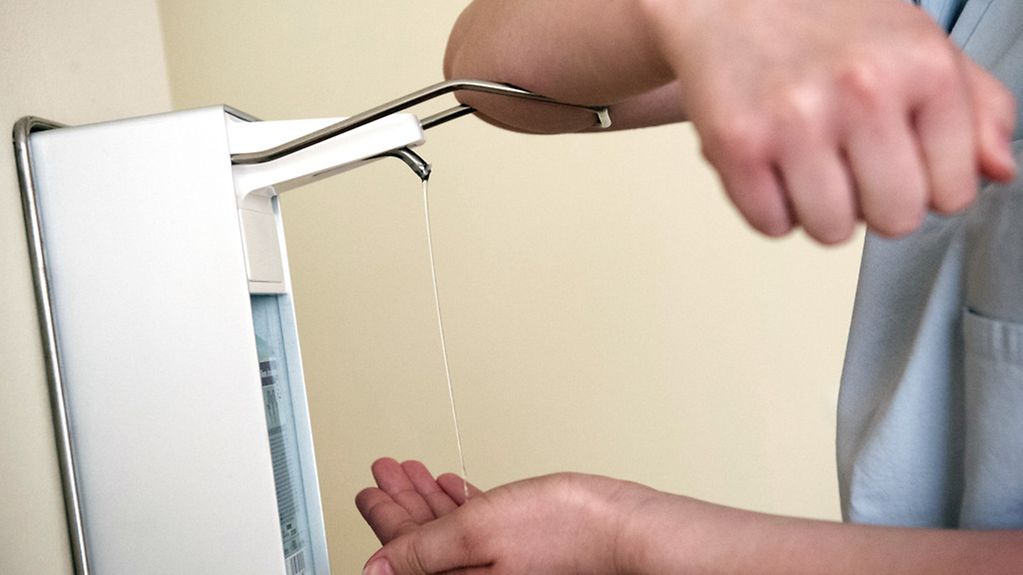Health
Every year between 400,000 and 600,000 treatment-related hospital infections occur in Germany. One third of them could be prevented, among other things through better compliance with hygiene standards. With a view to reducing the number of infections, wirksam regieren in cooperation with the National Reference Centre for the Surveillance of Nosocomial Infections has developed a programme aimed at enhancing infection prevention in intensive care units. A test carried out in around 100 hospitals across Germany shows that the participation in the "Together for Infection Prevention" programme greatly improves hand hygiene in intensive units and furthers the development of a culture of prevention in German hospitals. The programme is now to be made available to hospitals throughout Germany.
2 min reading time

Hand disinfection
Photo: picture alliance/dpa
Higher standards could prevent up to 200,000 hospital infections per year
According to data from the Robert Koch Institute, every year between 400,000 and 600,000 treatment-related hospital infections occur in Germany resulting in around 15,000 deaths. Current studies have shown that one third of these infections could be prevented. The hand hygiene of doctors and nursing staff is key to preventing the transmission of pathogens and infections. One of the aims of a 10-point plan by the Federal Ministry of Health is to further improve hygiene standards in hospitals. Wirksam regieren has supported this goal by developing the Together for Infection Prevention programme.
Cooperation and the development of a culture of prevention are crucial in reducing the risk of infection
There are recommendations and regulations on hand hygiene aimed at preventing infections. However, this knowledge alone will not ensure that the hand hygiene recommendations are consistently followed in everyday working routines. There are many different reasons for this.
"Together for Infection Prevention" relies on cooperation and a change of culture in infection prevention. Nursing staff, doctors and hygiene experts are working together to exchange information, identify concrete problems in working procedures and develop solutions. The hygiene competences in intensive care units are enhanced in a targeted manner through regular exchanges with hygiene experts at patients’ beds. Professional feedback on the level of hygiene ensures transparency and that problems are dealt with openly. They show the intensive care unit team what works and where adjustments are necessary.
The "Together for Infection Prevention" programme greatly improves hygiene levels in intensive care units on a sustainable basis.
"Together for Infection Prevention" was empirically tested between February 2016 and August 2018 in around 100 hospitals across Germany. The findings of the study show that the programme has greatly improved the prevention of infections: hand hygiene compliance in the participating units increased steadily in the course of the programme. In a first study cohort, it rose from 72% to 86% on average. Units which had previously had great difficulties complying with the required hygiene standards benefited particularly from the programme: hand hygiene in this group rose from 57% to 84% on average.
The results at a pilot unit indicate a marked improvement in infection prevention competences. Even a year after participating in the programme, hand hygiene compliance remained at the high level achieved as a result of the programme. In the intervention period, a reduction in bloodstream infections of 61% and in urinary tract infections of up to 72% was established in the pilot unit. Data on the sustainability during the entire study cohort are expected at the end of 2019.
Due to the findings of this study and the thoroughly positive feedback from the participating hospitals, the programme "Together for Infection Prevention" is now to be made available to hospitals throughout Germany.
Cooperation partners:
National Reference Centre for the Surveillance of Nosocomial Infections
Robert Koch Institute
on behalf of the Federal Ministry of Health (BMG)